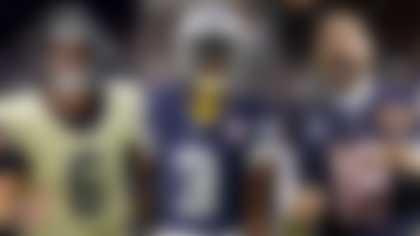Former NFL player and scout Bucky Brooks knows the ins and outs of this league, providing keen insight in his weekly notebook. The topics of this edition include:
But first, a look at one team that is going against the grain when it comes to roster construction ...
It's funny how, in a league supposedly driven by quarterback play, a Hall of Fame signal caller appears to believe that the best way to consistently compete for championships is to construct a team that isn't completely built around the QB.
Now, I know that statement sounds blasphemous, based on the constant assertions of coaches, scouts and league observers that the NFL is "a quarterback league" and you must have a "franchise QB" in place to hoist the Lombardi Trophy. But the teams that routinely fight for the league's biggest prize are just that: teams. That's right. In the ultimate team sport, it takes a well-rounded roster to win the brass ring, despite the fantasy football mindset that leads many to believe that riding a high-powered offense fueled by a strong-armed passer is the only recipe for success.
Of course, it helps to have an elite quarterback in the lineup who's capable of single-handedly sparking a championship run, but there are only a handful of those field generals walking the Earth today (Tom Brady, Aaron Rodgers, Ben Roethlisberger and Drew Brees), and even they need the timely contributions of a solid supporting cast to wind up in the winner's circle (each of those aforementioned passers won Super Bowls with defenses that ranked near the top of the league in critical categories like scoring D, takeaways, third-down conversions and sacks).
Thus, I've always thought most teams would be better served building their rosters around the other crucial positions (pass rushers, defensive backs, offensive line, wide receivers and running backs) to help a "game manager" thrive under center. This certainly isn't a sexy approach, but it is one that's helped the Seattle Seahawks become a Super Bowl champion and perennial contender in the NFC. In addition, the San Francisco 49ers became a juggernaut in the NFC using a similar strategy with Alex Smith and Colin Kaepernick functioning as quasi-role players on a defense-oriented team that bullied its way to three straight NFC Championship Games and a Super Bowl under Jim Harbaugh.
Broncos general manager John Elway seemed to realize the wisdom of this strategy when he suffered an embarrassing Super Bowl XLVIII loss at the hands of the Seahawks. Following that 43-8 defeat, Elway transitioned his squad from a group completely built around a high-priced quarterback into a team led by a nasty defense and an opportunistic offense still loaded with talented skill players on the perimeter.
From a personnel standpoint, the Broncos aggressively addressed the defense in the 2014 offseason. Denver scooped up DeMarcus Ware in the free-agent market to join Von Miller and give the team an explosive pass-rushing tandem on the edges. In the back end, Elway added Pro Bowlers Aqib Talib and T.J. Ward, as well as first-round pick Bradley Roby, to a secondary that already featured an emerging cover corner with a knack for playmaking in Chris Harris Jr. These offseason additions significantly upgraded the defense as a whole. And the Broncos have done a fine job developing players: DE Derek Wolfe and LB Brandon Marshall are growing into top talents at their respective positions, while youngsters Shane Ray and Shaquil Barrett flash plenty of promise for the future. Long story short, the Broncos now have a solid core in place to keep the defense among the elite units in football for years to come.
On offense, the Broncos retained running backs C.J. Anderson and Ronnie Hillman this offseason -- while also adding versatile RB Devontae Booker in the draft -- to anchor the ground attack. Meanwhile, ongoing discussions with Emmanuel Sanders could eventually result in a deal that would lock in one of the NFL's most explosive receiving corps for the foreseeable future, with Demaryius Thomas already signed long term.
Oh yeah, and before last season, Elway also asked his marquee player (Peyton Manning) to take a substantial pay cut to facilitate some of the necessary spending on the supporting cast. How did last season end again? That's right: With Denver claiming its third Super Bowl title.
All of that explains why I believe Elway absolutely played his cards right with the way he handled the Broncos' quarterback situation this offseason. I mean, this is a team that is not only set up to make a run at a repeat, but Denver has a solid core in place that should keep it in contention for the next five years. It didn't make sense to blow the budget on inexperienced quarterback Brock Osweiler (seven career starts). Sure, it would've been an easier transition for the team if Osweiler stayed on board as the starter after serving as an apprentice for four seasons, but paying $18 million per year to a glorified game manager doesn't make sense when the supporting cast is ultimately more responsible for the team's success.
Remember, the Broncos won Super Bowl 50 despite posting the second-worst passing efficiency mark in the league -- a combined 74.2 quarterback rating for the regular season and postseason, 13.5 points lower than the league average of 87.8. Think about that: The Broncos won a title with their quarterbacks performing well below average. Why would they expend nearly one-eighth of their salary cap on a player who's not a major contributor to the team's success?
I wonder why other teams are so willing to pay big money for middling quarterback play when it rarely pays off in a playoff run or Super Bowl ring without the support of capable complementary players. Just look at the big-money deals teams have thrown at the likes of Matt Ryan (74-52 regular season; 1-4 postseason), Ryan Tannehill (29-35, no playoff appearances), Jay Cutler (67-67, 1-1 postseason), Matthew Stafford (42-51, 0-2 postseason) and Sam Bradford (25-37-1, no playoff appearances) despite their minimal accomplishments as team leaders. If quarterbacks are ultimately judged by wins, do any of those guys offer a positive return on investment?
I'm sure this line of thinking will lead to a few "hater" comments below and in my mentions on Twitter, but I seriously can't understand why teams continue to sink cash into quarterbacks who aren't elite when that kind of monetary commitment prevents the franchise from surrounding its QB with the supporting cast he'll need to thrive. That's why Elway might be onto something this year, electing to fill his quarterback room with Mark Sanchez ($4.5 cap number in 2016), Trevor Siemian ($538,196) and rookie Paxton Lynch ($1,722,965). While I'm not ready to proclaim any of those guys a "franchise quarterback," I do believe the Broncos' system and supporting cast will make it hard for the starter to fail if he adheres to the premise of playing winning football (smart decision making and minimal turnovers) from the pocket.
I recently spoke to a veteran NFL head coach about the importance of having a strong supporting cast in place to alleviate the pressure on the quarterback, and he told me that you always like to "spread the responsibilities" throughout the team because it can be "too big of a burden" for the quarterback to consistently carry the mail.
Based on the Broncos' rock-solid performance Thursday night in their preseason opener against the Chicago Bears, it appears that Sanchez (10 of 13 for 99 yards with a touchdown and an interception), Siemian (7 of 12 for 88 yards) and Lynch (6 of 7 for 74 yards) are capable of succeeding on a team that simply needs a bus driver to take it back to the promised land.
Depending on how Denver fares in 2016 and beyond, this could be the start of a roster-building revolution that places the emphasis back on the team, as opposed to the one guy who takes snaps.
THE REBUTTAL: Dallas Cowboys defense
Many view Dallas as the favorite in the NFC East, but the team's lack of defensive firepower -- partially due to the suspensions of several key players -- could prevent Jason Garrett's squad from taking the division crown. With that in mind, I trekked down to Oxnard and asked veteran DB Orlando Scandrick a few questions to see if Cowboys fans should believe in a short-handed unit trying to win with sheer effort and desire. Scandrick is back in action after missing the entire 2015 campaign due to a knee injury. Here are a few highlights from our conversation:
Why should we believe this Cowboys defense can lead the team on a championship run?
Orlando Scandrick: "I think you should believe in our defense because we have the will, the fight and determination to make it happen."
How tough is it to hold up in the secondary without a consistent pass rush?
OS: "It is a big responsibility to hold up and pay attention to the details, and you have to play every play. Playing in the secondary, you can play 59 plays and if you have one bad play, you had a bad game -- you let everyone down. Secondary is the last line of defense."
Before your injury, there were a lot of analysts who thought you were a top-10 corner in this league. Why should we believe that you can get back to that level after tearing your ACL and MCL?
OS: "The amount of work that I've put in ... it can't even be described in words. I'm a worker and I've continued to get better every day, every practice, every second of every practice. This is what I do. This is part of me. This is who I am. A worker is who I am."
MY TAKE
There is clearly a ton of pressure on the defense to find a way to play at a high level without a marquee player along the front line. The team has put all of its faith in Rod Marinelli working a miracle with the unit by getting each defender to buy into the importance of effort and execution on each snap. Now, I love the intensity and discipline that I saw from the defense when I watched practice. I saw 11 defenders flying to the ball on every play and the emphasis was clearly on generating turnovers after the disappointing performance a season ago, when Dallas had an NFL-low 11 takeaways. Guys were raking and punching at the ball at every turn, and the coaches dedicated multiple periods before, during and after practice to this pursuit. While I do believe the diligent work on the practice field will result in better production in that area, I still have major concerns about the lack of an established pass rusher. The suspensions of Randy Gregory and Demarcus Lawrence will leave the team without a proven speed rusher off the edge, and I just don't know if the worker bees (Tyrone Crawford and Benson Mayowa) can get it done consistently. The Cowboys probably will need to resort to more blitzing in order to apply heat on the passer, and that puts a tremendous amount of pressure on the secondary to hold up in man coverage.
To the unit's credit, the secondary looked good in practice, with Mo Claiborne and Brandon Carr holding their own on the edges in man coverage. Claiborne, in particular, looked good in bump-and-run coverage, and I overheard Dez Bryant single out the former LSU standout as being one of the best cover corners in training camp this year. That sentiment was echoed by several team officials and observers when I asked for a few stars of Oxnard.
As far as Scandrick goes, I believe he is on track to regain his form as one of the top cover corners in the NFL. He was moving well in drills and his turns/transitions were flawless on the perimeter. I'm sure it will take him a couple of games to knock off the rust, but I would expect him to re-emerge as the Cowboys' CB1 early in the season.
ASK THE LEAGUE: Blaine Gabbert or Colin Kaepernick?
When Chip Kelly was hired as the head coach of the San Francisco 49ers, he inherited a murky quarterback situation that featured a pair of former 2011 draft picks slated to battle for the starting job. Colin Kaepernick had been the team's starting quarterback since the middle of the 2012 season, but a combination of injuries and disappointing performances in 2015 opened the door for Blaine Gabbert to slide into the role. Gabbert seized the opportunity by playing the best football of his career and displaying some of the talent that made him the 10th overall pick in 2011. Gabbert played so well down the stretch that I tweeted a relatively bold proclamation:
With the Kaepernick and Gabbert duking it out for the QB1 job over the next few preseason games, I thought this would be a perfect time to reach out to some NFL folks and get their take on the battle. Here's what I asked them:
If you had to build a team around one of the 49ers' quarterbacks, which one would you choose: Colin Kaepernick or Blaine Gabbert?
NFC senior personnel executive: "It's not even close: Kaepernick. The kid has talent and has been successful in this league. Look at how he played under Jim Harbaugh. I mean, Harbaugh is a helluva coach and he made the kid look like a superstar. You have to find a niche for him, but he's shown us that he can win big games. You just don't lose that ability."
AFC director of player personnel: "Given what we already know about both guys, I'll take Kaepernick. I'm not sure Gabbert has one quality other than size that can be elite. He also tends to shrink under pressure."
Second AFC director of player personnel: "I don't want either one, but if I had to choose, I would go with Gabbert. I don't like what I heard about Kaepernick's work ethic and his leadership skills in that locker room, so I would rather go down with a guy that appears to be 'all in.' I know Gabbert lacks pocket awareness and some other stuff, but I would take my chances on the guy who is the hardest worker and the one that the team rallies behind."
NFC director of pro scouting: "Of the two, I would say Kaepernick. I just know that we would have to run a college-style offense built on his ability to run the ball and set up our passing game off of it. His most successful year in the league came when he pulled the ball down and ran. Like most quarterbacks with his skill set, he tried to become a 'real QB' and it took away from what he does best."
AFC pro scouting director: "If I'm running a pure dropback system, then I'm going with Gabbert. But if I'm running read-option stuff, boots, roll-outs and waggle, then I'm going with the more mobile Kaepernick. Having him sit in the pocket and throw downfield is counterproductive for a quarterback with his traits."
MY TAKE
The 49ers' quarterback competition is one of the most compelling preseason battles in the NFL based on the stark differences between both players. Kaepernick has been a winner in the past with an unorthodox game that's built on athleticism, running skills and a big arm. He isn't a perfect fit for a traditional scheme, but he has shown the football world that he can lead a team on a run when playing in a movement-based scheme built around his unique talents. Of course, Kaepernick has looked nothing like that player the past two seasons, and his recent struggles in the passing game (59 percent completion rate with 6:5 touchdown-to-interception ratio and a 78.5 passer rating in nine games last season) have led to questions about his ability to read a defense from the pocket. The sixth-year pro hesitates with his finger on the trigger and his indecisiveness allows defenders to make plays on balls that should be easy completions.
Meanwhile, Gabbert is a traditional pocket passer with the prototypical traits (size, arm talent and athleticism) to be a franchise quarterback -- but he has struggled to win games in the league as a starter (see: 8-27 career mark). Now, I don't know how many young quarterbacks could've won in Jacksonville in the midst of multiple coaching changes and roster turnover, but Gabbert's on-field performance led scouts to question his courage and toughness, as he routinely wilted under pressure. Evaluators wondered if he had enough pocket poise or awareness to survive as a dropback passer in a league littered with speedy edge rushers and destructive interior defenders. To his credit, Gabbert looked like a much different quarterback when he stepped onto the field for the 49ers, repeatedly delivering the ball on time and on target to his receivers on the perimeter. Most importantly, Gabbert played with the kind of swagger and moxie that endeared him to his teammates -- a huge deal in an NFL locker room.
In the end, this competition will come down to which player is the best fit for Chip Kelly's scheme (mix of read-option run game and West Coast aerial attack). While I would opt for the ultra-athletic Kaepernick and build around his intriguing skills as a dual-threat playmaker, I believe Gabbert's ability to execute a "pure progression" passing game (quarterback works across the field based on coverage) gives him the edge in this battle. Most NFL offensive coaches value their scheme over the skills of their players because the play caller/play designer receives the credit for the unit's success. That's why I think Kelly's reputation as an offensive guru could lead him to install Gabbert into the lineup because it would show the football world that his system can work at the highest level. Remember, Gabbert is just about as athletic as Kaepernick (check out their combine results and you'll be surprised), but is a bit more polished working through complex reads from the pocket. Thus, the 49ers could still mix in read-option and some designed quarterback runs while using a traditional passing game with a few RPOs (run-pass options) to attack the defense from every angle. Considering how well Kelly's offense performed with some non-athletic quarterbacks running his system in Philadelphia, the insertion of Gabbert into the lineup could prove fruitful for San Francisco.
NEXT-GEN STATS: Why Tyrod Taylor is a franchise quarterback
The Buffalo Bills just signed Tyrod Taylor to a six-year contract extension, a move I roundly applaud. I think Taylor is an electric QB1 capable of leading the team into the playoffs and beyond. As a first-time starter last year, he completed 63.7 percent of his passes with a 20:6 TD-to-INT ratio and 99.4 passer rating. In addition, he rushed for 568 yards and four touchdowns, displaying cat-like quickness and burst with the ball in his hands. And the Bills went 8-6 in his 14 starts.
Taylor's numbers in 2015 were on par with the debut seasons of perennial Pro Bowl selectees Russell Wilson (64.1 completion percentage, 26:10 TD-to-INT ratio, 100.0 passer rating; 489 rushing yards and four scores in 2012) and Cam Newton (60.0 completion percentage, 21:17 TD-to-INT ratio, 84.5 passer rating; 706 rushing yards and 14 scores in 2011).
The Bills' QB1 is more than a run-around wizard with a big arm. He is one of the most efficient pocket passers in the game. Last season, Taylor compiled a 101.6 passer rating on throws from inside the pocket, which ranked seventh among quarterbacks with at least 200 pass attempts. He also completed 65.2 percent of his passes from the pocket and amassed a 17:5 TD-to-INT ratio on those throws. Considering how many times we hear evaluators discuss the importance of being able to play from the pocket, Taylor's production should quiet the skeptics questioning his ability to pick apart defenses with his arm.
Digging deeper into the numbers, Taylor's efficiency as a passer should be appreciated more due to his aggressive approach from the pocket. He not only led the NFL in downfield passing percentage (19 percent of his throws traveled 20-plus air yards), but he tied Wilson for most passing touchdowns of 20-plus air yards (12). Most impressive: He finished with a 101.9 passer rating on vertical throws (20-plus air yards) while displaying the big-play ability that every NFL offensive coordinator covets in a franchise quarterback.
Speaking of Watkins, I think Taylor's performance with and without the ultra-explosive pass catcher also cements his status as a franchise quarterback. With Watkins on the field (326 pass plays), Taylor completed 62.9 percent of his passes and tallied a fine 17:5 TD-to-INT ratio. On the flip side, Taylor was even more efficient in some ways without Watkins on the field (90 pass plays), completing 66.7 percent of his passes with a 3:1 TD-to-INT ratio. This shows how well Taylor can adapt his game to a "small ball" approach without his deep threat on the field.
For comparison's sake, we saw Philip Rivers' production dip without Keenan Allen. The Chargers quarterback completed 71.0 percent of his passes with a 16:7 TD-to-INT ratio with Allen on the field (327 pass plays). Without Allen (373 pass plays), Rivers' completion percentage plummeted to 62.0 and he posted a 13:6 TD-to-INT ratio.
Part of Taylor's success is also due to his athleticism and running skills. As a key contributor to the NFL's No. 1 rushing attack, Taylor led all NFL quarterbacks in rushing yards per game (40.6) and his ability to gain yards on designed quarterback runs or impromptu scrambles made him a nightmare to defend. Just take a look at the montage below from his spectacular performance against the Tennessee Titans:
Now, I must admit that I didn't expect Taylor to tear up the league as a surprise starter for the Bills, but Pittsburgh Steelers head coach Mike Tomlin told me last offseason that the former Virginia Tech standout was an "alpha dog" with special skills and a dynamic game. But I couldn't go all in on his talent and potential without seeing him take a snap as a starter. Now, after a Pro Bowl campaign, I'm convinced: Taylor's a legit franchise QB and the Bills were wise to lock him up.
Follow Bucky Brooks on Twitter @BuckyBrooks.












